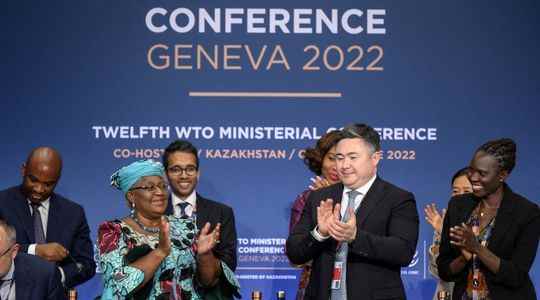Removal of patents for anti-covid vaccines, illegal fishing, food insecurity, reform of the WTO and electronic transactions. These are the five themes that focused attention and tension for five days in Geneva on the occasion of the twelfth ministerial conference of the World Trade Organization (WTO). The 164 Member States managed to agree on a package of measures, despite the many disagreements between certain nations and the geopolitical tensions linked to the war in Ukraine.
This is an “unprecedented” result snatched after intense negotiations, underlined Thursday, the director general of the world trade organization, Ngozi Okonjo-Iweala. Valdis Dombrovskis, European Commissioner for Trade, meanwhile hailed “an important result of global reach”, adding that “the deep differences here confirm that the organization needs to be reformed in depth”.
Many delegations, like the United States of the European Union, or even African countries, are indeed calling for a reform of the WTO. As expected, the ministers did not draw up a detailed program but a plan for reform. The text calls for “improving all functions” of the organization, whose rules have hardly changed since its creation in 1995, and calls for the dispute settlement system (the WTO tribunal) be fully operational again “for 2024”. The appeal body of the world trade policeman, whose appointment of judges is blocked by Washington, has not been operational since December 2019, due to a lack of sufficient judges.
- Temporary lifting of vaccine patents
After two and a half years of health crisis, an agreement on intellectual property was finally reached in order to temporarily lift – for five years – the patents protecting anti-Covid vaccines for developing countries. The text, which should in particular make it possible to prevent the trade in ingredients and materials necessary for the fight against pandemics from being restricted when they are most needed, was the subject of long exchanges between Beijing and Washington to agree on the definition of beneficiaries.
A big standoff also took place between the pharmaceutical lobbies, the developing countries and the many NGOs present. “It was a long fight but it’s done,” said Ngozi Okonjo-Iweala at a press conference. The NGO Doctor Without Borders believes for its part that “this text fails to guarantee people real access to the medical devices they need, it does not lift patents adequately and it does not concern all countries”.
Member States have also renewed the moratorium on electronic transactions (which agrees not to impose customs duties since 1998), despite the reluctance of India and South Africa. The two nations regret seeing a potential customs manna from these exchanges escape them.
- A mixed agreement on fishing
The text aimed at removing and banning subsidies that threaten the sustainability of fishing, the scene of tough negotiations, has been largely watered down under pressure from India, according to several sources close to the discussions. Leaders therefore focused on ending subsidies contributing to illegal, unreported and unregulated fishing, and fishing aids for overexploited fish stocks. Developing countries have two years after the entry into force of the agreement to apply this principle.
However, it is the first time that the WTO has concluded “an agreement that has environmental sustainability at its heart”, underlined the organization’s director general, Ngozi Okonjo-Iweala. The text thus makes “a first but important step forward” in order to reduce subsidies contributing to overfishing and overcapacity “by ending subsidies to fishing on the high seas”, she specifies. Even if concretely, for lack of consensus, questions related to overcapacity will have to be decided later. It was also decided to attack the opacity of the sector. States will have to share certain information (such as the identity of vessels operating illegally) under the guidance of a committee within the WTO.
According to United Nations estimates, 34% of fish populations are overexploited and will not be able to recover. Since 2015, the UN has therefore been calling for a reduction in all public support that encourages the overexploitation of the ocean: construction and modernization of ships, acquisition of new engines, equipment, fish detection technologies, without which the very expensive campaigns on the high seas or the towing of heavy trawls on the seabed would not be profitable.
- Ministerial declaration on food insecurity
The Russian-led war in Ukraine deprives the world of grain and fertilizer, drives up prices and threatens millions of people around the world with hunger. The text on food insecurity was therefore particularly awaited, although it is only a ministerial declaration. The latter does not mention by name the invasion of Ukraine by Russia and the food crisis it is causing, but nevertheless stresses the importance of “not imposing prohibitions or restrictions on exports” which are contrary to the WTO rules.
The countries have also decided not to impose “prohibitions or restrictions on food products purchased for humanitarian purposes” by the World Food Programme, one of the main UN agencies. Once again, India expressed its reluctance on the subject, before finally joining the consensus.
